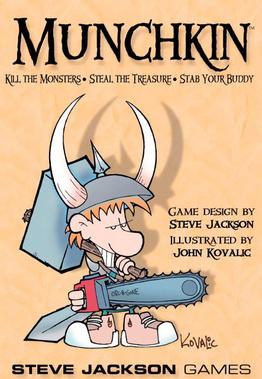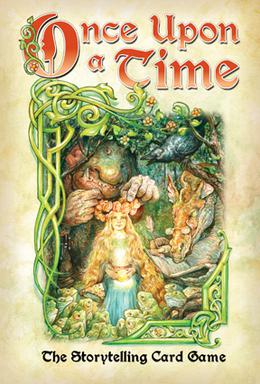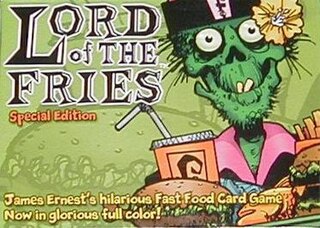
Contract bridge, or simply bridge, is a trick-taking card game using a standard 52-card deck. In its basic format, it is played by four players in two competing partnerships, with partners sitting opposite each other around a table. Millions of people play bridge worldwide in clubs, tournaments, online and with friends at home, making it one of the world's most popular card games, particularly among seniors. The World Bridge Federation (WBF) is the governing body for international competitive bridge, with numerous other bodies governing it at the regional level.

Oh Hell or Contract Whist is a trick-taking card game of British origin in which the object is to take exactly the number of tricks bid. It was first described by B. C. Westall around 1930 and originally called Oh! Well. It was said to have been introduced into America via the New York clubs in 1931. Phillips and Westall describe it as "one of the best round games."

Steve Jackson Games (SJGames) is a game company, founded in 1980 by Steve Jackson, that creates and publishes role-playing, board, and card games, and the gaming magazine Pyramid.

Kill Doctor Lucky is a humorous board game designed by James Ernest and released in 1996 by Cheapass Games. In 1998, Kill Doctor Lucky won the Origins Award for Best Abstract Board Game of 1997.

Spades is a trick-taking card game devised in the United States in the 1930s. It can be played as either a partnership or solo/"cutthroat" game. The object is to take the number of tricks that were bid before play of the hand began. Spades is a descendant of the Whist family of card games, which also includes Bridge, Hearts, and Oh Hell. Its major difference as compared to other Whist variants is that, instead of trump being decided by the highest bidder or at random, the Spade suit always trumps, hence the name.
Cheapass Games is a game company founded and run by game designer James Ernest, based in Seattle, Washington. Cheapass Games operates on the philosophy that most game owners have plenty of dice, counters, play money, and other common board game accessories, so there is no need to bundle all of these components with every game that requires them. Cheapass games thus come packaged in white envelopes, small boxes, or plastic resealable bags containing only those components unique to the game - typically a rules sheet, a playing board printed on card stock, and game cards banded by magazine-cutout "sleeves". This allows the company to produce games for prices well below the market average. Later, Cheapass started offering some higher-quality, full color games under the "James Ernest Games" brand.

Munchkin is a dedicated deck card game by Steve Jackson Games, written by Steve Jackson and illustrated by John Kovalic. It is a humorous take on role-playing games, based on the concept of munchkins.
Zombies!!! is a tile-based strategy board game for two to six players. Zombies!!! won the 2001 Origins Award for Best Graphic Presentation of a Board Game, and Zombies!!! 3: Mall Walkers won 2003's Origins Award for Best Board Game Expansion.
A Game of Thrones is a strategy board game created by Christian T. Petersen and published by Fantasy Flight Games in 2003. The game is based on the A Song of Ice and Fire series of high fantasy novels by George R. R. Martin. It was followed in 2004 by the expansion A Clash of Kings, and in 2006 by the expansion A Storm of Swords.
The Great Brain Robbery is a board game designed by James Ernest and released in 2000 by Cheapass Games.
Pedro is an American trick-taking card game of the All Fours family based on Auction Pitch. Its most popular variant is known as Cinch, Double Pedro or High Five which was developed in Denver, Colorado around 1885 and soon regarded as the most important American member of the All Fours family. Although it went out of fashion with the rise of Auction Bridge, it is still widely played on the western coast of the United States and in its southern states, being the dominant game in some locations in Louisiana. Forms of the game have been reported from Nicaragua, the Azores, Niobe NY, Italy and Finland. The game is primarily played by four players in fixed partnerships, but can also be played by 2–6 individual players.
Pitch is the American version of the English trick-taking game of Blind All Fours which, in turn, is derived from classic All Fours. Historically, Pitch started as "Blind All Fours", a very simple All Fours variant that is still played in England as a pub game. The modern game involving a bidding phase and setting back a party's score if the bid is not reached came up in the middle of the 19th century and is more precisely known as Auction Pitch or Setback.
Falling is a real-time card game from James Ernest in which all players are falling from the sky for no apparent reason. The object of the game is to hit the ground last. As the box copy says, "It's not much of a goal, but it's all you could think of on the way down."

Bid Euchre, Auction Euchre, Pepper, or Hasenpfeffer, is the name given to a group of card games played in North America based on the game Euchre. It introduces an element of bidding in which the trump suit is decided by which player can bid to take the most tricks. Variation comes from the number of cards dealt, the absence of any undealt cards, the bidding and scoring process, and the addition of a no trump declaration. It is typically a partnership game for four players, played with a 24, 32 or 36-card pack, or two decks of 24 cards each.

Once Upon a Time is a card game produced by Atlas Games, originally released in 1994 with a second edition published in December 1995 and the current third edition in October 2012. One object of Once Upon a Time is to tell a fairy tale as a group. While the story is developed by the whole group, the competitive aspect of the game is that each player has an individual goal of using all of the "Storytelling" cards they have in hand, and finishing the story with their own special "Happy Ever After" card.

Lord of the Fries is a card game created by James Ernest and published by Cheapass Games and Steve Jackson Games. In 2008, Steve Jackson Games released a new edition with revised game components. In 2015, Cheapass Games released a fourth edition and four expansion decks. Lord of the Fries takes place at Friedey's: The Fast Food Restaurant of the Damned. Other games that take place there include Give Me the Brain and Change!.
Girl Genius: The Works is a card game announced in March 2001 as scheduled for an April 2001 release, and was out by summer as it was reviewed in July 2001. It is played with a specially designed deck of 108 cards. The game, designed by Phil Foglio and James Ernest, takes its theme from the "gaslamp fantasy" of the Girl Genius comic book series. The goal is to be the first player to reach 100 points by "popping" cards out of a two-dimensional layout.
Smear is a North-American trick-taking card game of the All Fours group, and a variant of Pitch (Setback). Several slightly different versions are played in Michigan, Minnesota, Northern and Central Iowa, Wisconsin and also in Ontario, Canada.

The following is a glossary of terms used in card games. Besides the terms listed here, there are thousands of common and uncommon slang terms. Terms in this glossary should not be game-specific, but apply to a wide range of card games. For glossaries that relate primarily to one game or family of similar games, see Game-specific glossaries.
The Genius: Rules of the Game is the first season of The Genius debuted on tvN on April 26, 2013.










